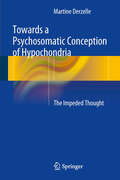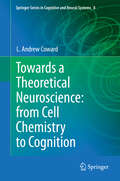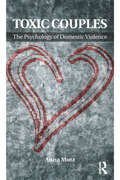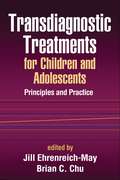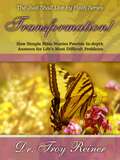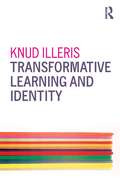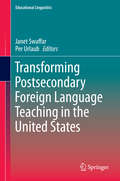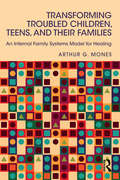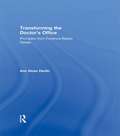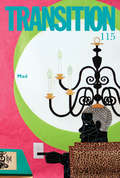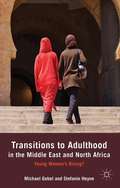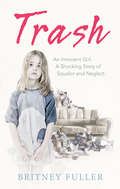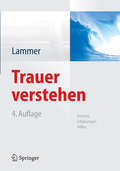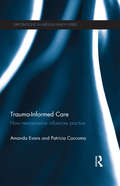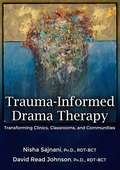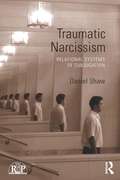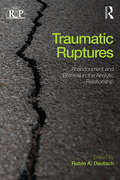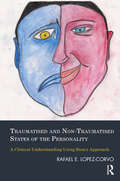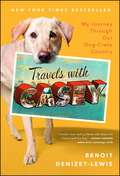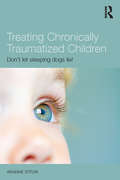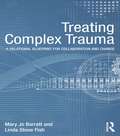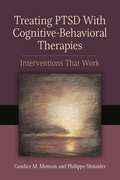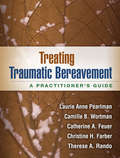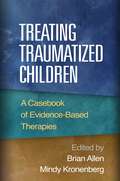- Table View
- List View
Towards a Psychosomatic Conception of Hypochondria
by Martine DerzelleA rigorous and groundbreaking study. Martine Derzelle is the first researcher to approach hypochondria as a relational pathology. Martine Derzelle is the first researcher to approach hypochondria as a relational pathology. The author tackles a subject that has puzzled care professionals for decades: hypochondria. Martine Derzelle confronts all specialists (psychotherapists, psychiatrists, doctors, psychosomaticians) with the paradox of this pathology and the theoretical void on which the approach to those patients who express a suffering of various kinds has stood for more than a century. In the first part, the author highlights the lack of theoretical elaboration on hypochondria in the existent literature; in the second part, on the basis of clinical examples, she analyzes the nature of the disease, and then offers a completely innovative theoretical elaboration. Finally, in the third part, she proposes a new and specific approach to treating this pathology at both the theoretical and clinical levels within the framework of psychoanalysis and implementing key concepts from relational psychosomatics.
Towards a Theoretical Neuroscience: from Cell Chemistry to Cognition
by L. Andrew CowardThe book explains how to understand cognition in terms of brain anatomy, physiology and chemistry, using an approach adapted from techniques for understanding complex electronic systems. These techniques create hierarchies of information process based descriptions on different levels of detail, where higher levels contain less information and can therefore describe complete cognitive phenomena, but are more approximate. The nature of the approximations are well understood, and more approximate higher level descriptions can therefore be mapped to more precise detailed descriptions of any part of a phenomenon as required. Cognitive phenomena, the anatomy and connectivity of major brain structures, neuron physiology, and cellular chemistry are reviewed. Various cognitive tasks are described in terms of information processes performed by different major anatomical structures. These higher level descriptions are selectively mapped to more detailed physiological and chemical levels.
Toxic Couples: The Psychology Of Domestic Violence
by Anna MotzDomestic violence is a major public health concern, affecting millions worldwide. It is underreported, often devastating and sometimes ends in murder. In Toxic Couples: The Psychology of Domestic Violence, Anna Motz integrates psychological and criminological data with clinical illustrations and discussion of current high-profile cases. She examines the complex manifestations and multiple causes of intimate partner violence. Motz disentangles the roles played by those involved and examines the addictive nature of these damaging partnerships. The book describes various forms of abuse, including physical, sexual and emotional, and analyses how intimate partner violence can escalate to murder. She explores important factors including: the role of addiction; homelessness and vulnerability; the intergenerational transmission of abuse; sadomasochistic relationships; honour-based violence. The book emphasizes the significance of female- as well as male-perpetrated violence and outlines the powerful impact on the children of abusive parents, extending the clinical awareness of professionals working with those affected. Toxic Couples: The Psychology of Domestic Violence is ideal for clinicians working with the victims and perpetrators of intimate partner violence, for students of psychology, gender studies and social care courses and for anyone interested in the psychological forces behind violence in relationships.]
Transdiagnostic Treatments for Children and Adolescents
by Brian C. Chu Jill Ehrenreich-MayThis volume presents cutting-edge advances in case conceptualization and intervention for children and adolescents, who typically present for mental health treatment with multiple, overlapping problems. Leading clinician-researchers examine common processes--including stress and coping, attention and interpretation biases, avoidant behaviors, and peer and family interactions--that underlie the development and maintenance of diverse forms of psychopathology. They describe exemplary treatments that target these processes and can be used across diagnostic categories. Chapters on specific treatment protocols address the theoretical foundations, clinical strategies used, which patient populations each treatment is suitable for, and the status of the empirical evidence base.
Transformation!: How Simple Bible Stories Provide In-Depth Answers for Life's Most Difficult Problems
by Troy ReinerOur society and churches are facing an increasing number of dysfunctional and emotionally hurting people with difficult, long-term psychological problems. Healing for these problems requires more than a few words of advice or some solution-focused therapy; it requires a life transformation. Unfortunately, most pastors and church counselors do not have in-depth Biblical answers for these complex problems. Consequently, most churches refer these problems to counselors outside of the church who rely primarily on secular counseling methods and theories, or psychoactive drugs. What is needed is a simple, yet in-depth, Biblical method for overcoming these complex problems that can be easily applied by pastors and counselors within the church. <p><p>This book provides just such a method with a new narrative Biblical approach for therapy and in-depth answers for counseling many of these difficult problems. This new method is developed directly from the Bible, relies on the overall direction of the Holy Spirit, and is based on Biblical truth derived from the stories of the lives of well-known Biblical characters. The final conclusion of this book is that God has provided in His word, through the types and shadows interpretation of these stories, all that is required to meet these desperate needs. <p><p>This book contains many new insights including a comprehensive plan for Christian counseling derived directly from the Bible, in-depth biblical answers for complex psychological problems based on the types and shadows interpretation of biblical stories, models and quick reference guides for counseling 20 of the most difficult problems in the church today including inferiority, abandonment, dysfunctional families, setting boundaries, six types of codependency, abuse, four types of addictions, bitterness, depression, grief, and suicide.
Transformative Learning and Identity
by Knud IllerisIn the current ever changing world – the liquid modernity – the most pressing psychological challenge to all of us is to create and maintain a personal balance between mental stability and mental flexibility. In Transformative Learning and Identity Knud Illeris, one of the leading thinkers on the way people learn, explores, updates and re-defines the concept and understanding of transformative learning while linking the concept of transformative learning to the concept of identity. He thoroughly discusses what transformative learning is or could be in a broader learning theoretical perspective, including various concepts of learning by change, as opposed to learning by addition, and ends up with a new, short and distinct definition. He also explores and discusses the concept of identity and presents a general model depicting the complexity of identities today. Building on the work of Mezirow, various perspectives of transformative learning are analysed and discussed, including; transformative learning in different life ages; progressive and regressive transformations; motivation and identity defence; development of identity; personality and competence, and transformative learning in school, education, working life, and in relation to current and future life conditions. This vital new book by one of the leading learning theorists of our time will prove of lasting interest to academics, teachers, instructors, leaders and researchers in the field of adult learning and education. It will also appeal to many students and researchers of psychology and sociology in general. ?
Transforming Postsecondary Foreign Language Teaching in the United States
by Janet Swaffar Per UrlaubThis volume addresses critical challenges and issues facing foreign language departments in colleges and universities across the U. S. It presents the insights of individuals who have built or are in the process of building foreign language curricula during a major transition period in postsecondary institutions. The authors of this volume come from various language departments and institutional experience from across the U. S. , including private and public postsecondary foreign language teachers, researchers and administrators. The chapters address issues and provide templates for curricular change at all learning levels. The five sections of this book explore: Changing Perceptions about Foreign Language Learning; The Case for a Multi-literacy FL Curriculum in Concept and Assessment Praxis; Curricular Transformations: Historical Hurdles and Faculty Heuristics; Rethinking the Graduate Curriculum; Foreign Languages' Integration into the Interdisciplinary University. "This thought-provoking and timely volume addresses the question of how historic and current disciplinary, institutional and political conditions affect curricular transformation in collegiate foreign language programs. Responding to the issues raised in the 2007 MLA Report, this collection of nine essays presents a diversity of curricular models and approaches from different theoretical perspectives focusing on the integration of language and content. The book will undoubtedly be of great interest to a broad audience, such as foreign language educators, curriculum designers, administrators, graduate students and researchers. " Nelleke Van Deusen-Scholl, Yale College, CT, USA.
Transforming Troubled Children, Teens, and Their Families: An Internal Family Systems Model for Healing
by Arthur G. MonesIn Transforming Troubled Children, Teens, and Their Families: An Internal Family Systems Model for Healing, Dr. Mones presents the first comprehensive application of the Internal Family Systems (IFS) Therapy model for work with youngsters and their families. This model centers diagnosis and treatment around the concept of the Functional Hypothesis, which views symptoms as adaptive and survivalbased when viewed in multiple contexts. The book provides a map to help clinicians understand a child’s problems amidst the reactivity of parents and siblings, and to formulate effective treatment strategies that flow directly from this understanding. This is a nonpathologizing systems and contextual approach that brings forward the natural healing capacity within clients. Dr. Mones also shows how a therapist can open the emotional system of a family so that parents can let go of their agendas with their children and interact in a loving, healthy, Self-led way. This integrative MetaModel combines wisdom from Psychodynamic, Structural, Bowenian, Strategic, Sensorimotor, and Solution-Focused models interwoven with IFS Therapy. A glossary of terms is provided to help readers with concepts unique to IFS. Unique to this approach is the emphasis on shifting back and forth between intrapsychic and relational levels of experience. Therapy vignettes are explored to help therapists address issues such as trauma, anxiety, depression, somatization, oppositional and self-destructive behavior in children, along with undercurrents of attachment injury. Two detailed cases are followed over a full course of treatment. A section on Frequently Asked Questions explores work with families of separation and divorce, resistance, the trajectory of treatment, dealing with anger, linking to twelve-step programs, and much more. This is an ideal book for any therapist in quest of understanding the essence of healing and seeking therapeutic strategies applied within a compassionate framework.
Transforming the Doctor's Office: Principles from Evidence-based Design
by Ann Sloan DevlinFrom the parking lot to the exam room, doctors can improve the physical surroundings for their patients, yet often they do not. Given the numerous and varied duties doctors must perform, it may fall to the design profession to implement changes, many based on research, to improve healthcare experiences. From location and layout to furnishings and positive distractions, this book provides evidence-based information about the physical environment to help doctors and those who design medical workspaces improve the experience of health care. Along with its research base, a special aspect of this book is the integration of relevant historical material about the office practice of physicians at the beginning of the twentieth century. Many of their design solutions are viable today. In addition to improving the physical design of healthcare facilities, author Ann Sloan Devlin is the granddaughter, daughter, and niece of physicians, as well as the granddaughter and daughter of nurses. She worked in a hospital during college, and has visited a good many practitioners’ offices in medical office buildings and ambulatory care settings. This book addresses an overlooked location of care: the doctor’s office suite.
Transitions to Adulthood in the Middle East and North Africa
by Michael Gebel Stefanie HeyneThis book identifies chances and barriers women face in their transition to adulthood in Egypt, Iran, Jordan, and Syria. Adopting a life course perspective, it provides a new integrative micro-macro-theoretical framework and innovative analyses of individual life courses based on longitudinal data.
Trash: An Innocent Girl. A Shocking Story of Squalor and Neglect.
by Britney Fuller‘To start: it was just me and my mom. I am an only child, and she is a single parent. My mother is a trash hoarder. Ever since I can remember the house was always messy and stunk. At around age 9ish I noticed that something was wrong. I started throwing bags of trash away every day, just to have my mom freak out when she got home. We didn’t eat at home anymore because the fridge was disgusting, and she used the sink as a trash can, so it got clogged. We always ate out, we never had a home-cooked meal, and I’ve never had a family dinner at a dinner table. I had a stool in the corner of the living room. That is what I sat on, and that alone. I kept that corner as clean as I could. Made sure there was foot space, and that there wasn’t dust on the walls. That was my corner, my space. It never seemed to matter though, eventually that spot would get overrun with trash too...’Trash is Britney Fuller's shocking account of growing up in the house of a hoarder.
Trauer verstehen
by Kerstin LammerTrauer verstehen Trauernden wirksam helfen, ihren Verlust zu bewältigen und sich in einer veränderten Lebenssituation neu zu orientieren - das leistet professionelle Trauerbegleitung. Wie das geht, zeigt dieses Buch. Kurz und bündig werden die Ergebnisse neuerer internationaler Trauerforschung aufbereitet und zu einem Praxismodell entwickelt. Drei Querschnitte präsentieren: - Studien, die Formen der Trauer beschreiben, - Theorien, die Trauer psychologisch erklären, - Modelle, die Trauer bewältigen helfen Mit vielen Schaubildern und Beispielen aus der Praxis. Formen, Erklärungen, Hilfen Der Leser, die Leserin findet ein verständliches Buch, das mit Mythen über Trauerprozesse aufräumt und eine hilfreiche Basis für die Bewältigungsarbeit mit Betroffenen sein kann. Die Autorin identifiziert Aufgaben, die Trauernde nach dem Verlust eines für sie bedeutsamen Menschen bewältigen müssen. Sie entwickelt daraus - als geeignetere Alternative zu gängigen Phasenmodellen - ihr Aufgabenmodell der Trauerbegleitung: - Tod begreifen helfen (Realisation) - Reaktionen Raum geben (Initiation) - Anerkennung des Verlusts äußern (Validation) - Übergänge unterstützen (Progression) - Erinnern und Erzählen ermutigen (Rekonstruktion) - Risiken und Ressourcen einschätzen (Evaluation) Eine praxisnahe Basis für die professionelle Beratung Trauernder
Trauer verstehen: Formen, Erklärungen, Hilfen
by Kerstin LammerTrauer verstehenTrauernden wirksam helfen, ihren Verlust zu bewältigen und sich in einer veränderten Lebenssituation neu zu orientieren – das leistet professionelle Trauerbegleitung. Wie das geht, zeigt dieses Buch. Kurz und bündig werden die Ergebnisse neuerer internationaler Trauerforschung aufbereitet und zu einem Praxismodell entwickelt. Drei Querschnitte präsentieren: - Studien, die Formen der Trauer beschreiben,- Theorien, die Trauer psychologisch erklären,- Modelle, die Trauer bewältigen helfenMit vielen Schaubildern und Beispielen aus der Praxis.Formen, Erklärungen, HilfenDer Leser, die Leserin findet ein verständliches Buch, das mit Mythen über Trauerprozesse aufräumt und eine hilfreiche Basis für die Bewältigungsarbeit mit Betroffenen sein kann. Die Autorin identifiziert Aufgaben, die Trauernde nach dem Verlust eines für sie bedeutsamen Menschen bewältigen müssen. Sie entwickelt daraus – als geeignetere Alternative zu gängigen Phasenmodellen – ihr Aufgabenmodell der Trauerbegleitung:- Tod begreifen helfen (Realisation)- Reaktionen Raum geben (Initiation)- Anerkennung des Verlusts äußern (Validation)- Übergänge unterstützen (Progression)- Erinnern und Erzählen ermutigen (Rekonstruktion)- Risiken und Ressourcen einschätzen (Evaluation)Eine praxisnahe Basis für die professionelle Beratung Trauernder
Trauma-Informed Care: How neuroscience influences practice (Explorations in Mental Health)
by Amanda Evans Patricia CoccomaThis accessible book provides an overview of trauma-informed care and related neuroscience research across populations. The book explains how trauma can alter brain structure, identifies the challenges and commonalities for each population, and provides emergent treatment intervention options to assist those recovering from acute and chronic traumatic events. In addition, readers will find information on the risk factors and self-care suggestions related to compassion fatigue, and a simple rubric is provided as a method to recognize behaviours that may be trauma-related. Topics covered include: children and trauma adult survivors of trauma military veterans and PTSD sexual assault, domestic violence and human trafficking compassion fatigue. Trauma-Informed Care draws on the latest findings from the fields of neuroscience and mental health and will prove essential reading for researchers and practitioners. It will also interest clinical social workers and policy makers who work with people recovering from trauma.
Trauma-Informed Drama Therapy: Transforming Clinics, Classrooms, and Communities
by David Read Johnson Nisha SajnaniA collection of thought provoking articles and descriptions of the powerful work that can be and is being done to help heal trauma.
Traumatic Narcissism: Relational Systems of Subjugation (Relational Perspectives Book Series)
by Daniel ShawIn this volume, Traumatic Narcissism: Relational Systems of Subjugation, Daniel Shaw presents a way of understanding the traumatic impact of narcissism as it is engendered developmentally, and as it is enacted relationally. Focusing on the dynamics of narcissism in interpersonal relations, Shaw describes the relational system of what he terms the 'traumatizing narcissist' as a system of subjugation – the objectification of one person in a relationship as the means of enforcing the dominance of the subjectivity of the other. Daniel Shaw illustrates the workings of this relational system of subjugation in a variety of contexts: theorizing traumatic narcissism as an intergenerationally transmitted relational/developmental trauma; and exploring the clinician's experience working with the adult children of traumatizing narcissists. He explores the relationship of cult leaders and their followers, and examines how traumatic narcissism has lingered vestigially in some aspects of the psychoanalytic profession. Bringing together theories of trauma and attachment, intersubjectivity and complementarity, and the rich clinical sensibility of the Relational Psychoanalysis tradition, Shaw demonstrates how narcissism can best be understood not merely as character, but as the result of the specific trauma of subjugation, in which one person is required to become the object for a significant other who demands hegemonic subjectivity. Traumatic Narcissism presents therapeutic clinical opportunities not only for psychoanalysts of different schools, but for all mental health professionals working with a wide variety of modalities. Although primarily intended for the professional psychoanalyst and psychotherapist, this is also a book that therapy patients and lay readers will find highly readable and illuminating.
Traumatic Ruptures: Abandonment And Betrayal In The Analytic Relationship (Relational Perspectives Book Series)
by Robin A. DeutschFor much of its history, psychoanalysis has been strangely silent about sudden ruptures in the analytic relationship and their immediate and far-reaching effects for those involved. Such issues of betrayal and abandonment – the death of an analyst, a patient’s suicide, an ethical violation – disrupt the stability and cohesion of the analytic framework and leave indelible marks on both individuals and institutions alike. In Traumatic Ruptures an international range of contributors present first-person, highly personal and sometimes painful accounts of their experiences and the occasionally difficult yet redeeming lessons they have taken from them. Presented in four parts, the book explores multiple meanings and consequences of the break in the analytic relationship. Part One, Ruptured Subjectivity: Lost and Found, presents accounts of clinical encounters with death. Part Two, Rupture: The Clinical Process, addresses the sudden loss of an analyst, the trauma of patient suicide and the issue of countertransference when working with patients who have suffered the unexpected loss of their first analyst. Part Three, The Long Shadow of Rupture, examines the effects of ethical violations in the short and long term. Finally, Part Four, Ruptures’ Impact on Organizations, looks at the wider impact of ethical and sexual boundary violations in the context of an organization and the effect of trauma on a psychoanalytic institute. By giving voice to issues that are usually silenced, the authors here open the door to understanding the complex nature of traumatic rupture within the analytic field. This intimate exploration of psychoanalytic treatments and communities is ideal for psychoanalysts, psychologists, clinical social workers, psychiatrists and family therapists. It is an important text for clinicians working with individuals who have experienced traumatic ruptures and for members of organisations dealing with their effects.
Traumatised and Non-Traumatised States of the Personality: A Clinical Understanding Using Bion's Approach
by Rafael E. Lopez-CorvoThis book provides, using Bion's insightful legacy, a practical and useful instrument to safely navigate the psyche. It offers an original conception of trauma and of the working mind between "traumatised" and "non-traumatised" states based on essentials taken from Bion's contributions.
Travels With Casey: My Journey Through Our Dog-crazy Country
by Benoit Denizet-LewisA moody Labrador and his insecure human take a funny, touching cross-country RV trip into the heart of America's relationship with dogs."I don't think my dog likes me very much," New York Times Magazine writer Benoit Denizet-Lewis confesses at the beginning of his journey with his nine-year-old Labrador-mix, Casey. Over the next four months, thirty-two states, and 13,000 miles in a rented motor home, Denizet-Lewis and his canine companion attempt to pay tribute to the most powerful interspecies bond there is, in the country with the highest rate of dog ownership in the world. On the way, Denizet-Lewis--known for his deeply reported dispatches from far corners of American life--meets an irresistible cast of dogs and dog-obsessed humans. Denizet-Lewis and Casey hang out with wolf-dogs in Appalachia, search with a dedicated rescuer of stray dogs in Missouri, spend a full day at a kooky dog park in Manhattan, get pulled over by a K9 cop in Missouri, and visit "Dog Whisperer" Cesar Millan in California. And then there are the pet psychics, dog-wielding hitchhikers, and two nosy women who took their neighbor to court for allegedly failing to pick up her dog's poop. Travels With Casey is a delightfully idiosyncratic blend of memoir and travelogue coupled with an exploration of a dog-loving America. What does our relationship to our dogs tell us about ourselves and our values? Denizet-Lewis explores those questions--and his own canine-related curiosities and insecurities--during his unforgettable road trip through our dog-loving nation.
Treating Chronically Traumatized Children: Don't let sleeping dogs lie!
by Arianne StruikProfessionals working with traumatized children are often asked whether it would be better to ‘let sleeping dogs lie’, because the child may not be ready to discuss their experiences, and out of fear that they may become further distressed or disturbed. In Treating Chronically Traumatized Children, Arianne Struik presents the case for waking those ‘sleeping dogs’ in a safe and structured environment, in order to allow the healing process to begin and prevent trauma later in life. Struik has developed a method for those cases labelled most difficult to treat, involving deregulated, traumatized children who refuse to talk about their memories, or claim to have ‘forgotten’ them completely. It incorporates factors in the child’s environment and network to ensure that they are safe and secure before beginning the process, and stable throughout treatment. Downloadable worksheets enhance the book’s content and make each section straightforward to work through, supporting the child through the stabilization, processing and integration phases of treatment. Illustrated throughout by case studies and comprehensive explanation of the theory and the treatment method, Treating Chronically Traumatized Children is clear and accessible and is ideal for psychologists, psychiatrists, psychotherapists and counsellors, as well as parents and anyone working with chronically traumatized children and adolescents.
Treating Complex Trauma: A Relational Blueprint for Collaboration and Change (Psychosocial Stress Series)
by Mary Jo Barrett Linda Stone FishIn Treating Complex Trauma, renowned clinicians Mary Jo Barrett and Linda Stone Fish present the Collaborative Change Model (CCM), a clinically evaluated model that facilitates client and practitioner collaboration and provides invaluable tools for clients struggling with the impact and effects of complex trauma. A practical guide, Treating Complex Trauma organizes clinical theory, outcome research, and decades of experiential wisdom into a manageable blueprint for treatment. With an emphasis on relationships, the model helps clients move from survival mindstates to engaged mindstates, and as a sequential and organized model, the CCM can be used by helping professionals in a wide array of disciplines and settings. Utilization of the CCM in collaboration with clients and other trauma-informed practitioners helps prevent the re-traumatization of clients and the compassion fatigue of the practitioner so that they can work together to build a hopeful and meaningful vision of the future.
Treating PTSD With Cognitive–Behavioral Therapies: Interventions That Work (Concise Guides on Trauma Care Series)
by Candice M. Monson Philippe ShnaiderThis compact, clinician-friendly resource walks readers through cognitive–behavioral techniques and treatment packages for clients with PTSD, using case studies to illustrate how to troubleshoot common problems. Research over the past three decades has confirmed that cognitive–behavioral therapies (CBTs) are among the most effective treatments for Posttraumatic Stress Disorder (PTSD). This book introduces clinicians to cognitive–behavioral techniques for PTSD and guides them in adopting treatment protocols. Because myths about CBT for PTSD have been barriers to use, the book offers a clear view of the facts about the evidence-based therapies that offer such promise in helping clients to heal from their traumas. The goal of this clinician-friendly book is clear: to make CBT available to suffering clients.
Treating Traumatic Bereavement: A Practitioner's Guide
by Laurie Anne Pearlman Christine H. Farber Camille B. Wortman Catherine A. Feuer Therese A. RandoThis book presents an integrated treatment approach for those struggling to adapt after the sudden, traumatic death of a loved one. The authors weave together evidence-based clinical strategies grounded in cutting-edge knowledge about both trauma and grief. The book offers a clear framework and many practical tools for building survivors' psychological and interpersonal resources, processing their trauma, and facilitating mourning. In a large-size format for easy photocopying, the book includes over 30 reproducible handouts. Purchasers can access a companion website to download and print these materials as well as supplemental handouts and a sample 25-session treatment plan. Winner (Second Place)--American Journal of Nursing Book of the Year Award, Psychiatric and Mental Health Nursing Category
Treating Traumatized Children
by Brian Allen Mindy KronenbergFeaturing extensive case studies, this volume provides a unique window into implementation of evidence-based treatments in real-world community settings. Experienced therapists illustrate the use of three effective therapies for traumatized children and their caregivers: trauma-focused cognitive-behavioral therapy (TF-CBT), child-parent psychotherapy (CPP), and parent-child interaction therapy (PCIT). Covering the entire process of assessment and intervention, the cases highlight ways to maintain treatment fidelity while addressing complex clinical challenges with diverse clients. Experts in the respective therapy models offer instructive commentaries at the end of each case. The book also provides a concise introduction to each model, including its theoretical underpinnings, empirical support, and applications.
